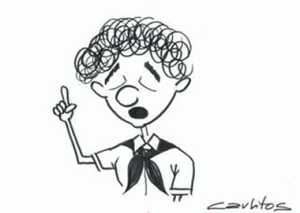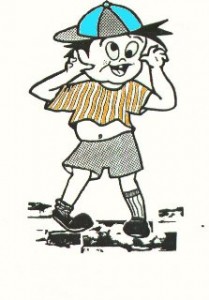Laughter, banter, kidding around have been group therapy on this island where the frustration and dissatisfaction is exorcised by humor. We laugh at ourselves, and that’s healthy, but we also make those who govern us the butts of our jokes, though generally in the privacy of the family or with a close circle of friends.
We assign nicknames, look for burlesque similarities between between one public figure and another, collect jokes and bust out laughing in a gesture that is sometimes more sad than happy. In short, what makes us roar with laughter would make us cry, if we couldn’t find a way to joke about it.
The terrible boy
This national trend to go overboard has found its personification in the character of a young boy, eternal scholar full of uncomfortable questions. Pepito, the principal figure of many of our satiric stories, has a sharp tongue and empty pockets. His stories circulate clandestinely, spread by word of mouth with each one adding another detail, a punch of pepper to spice up the adventures of this urchin. For as long as I can remember, I’ve been hearing about this boy who stars in almost all our jokes.
Pepito went to the moon when the Soviet Union and Cuba launched their first joint mission to space, he was with Pope John Paul II during his visit to Havana, and he swears he entered the secret bunker where Fidel Castro spent his convalescence. He has been everywhere and nowhere.
The strength of this enfant terrible is his ability to say what we are thinking, but don’t dare to verbalize. Pepito is Cuba, without the masks, without the double standard, without faking it. His anecdotes reflect the daily hardships, the long lines, and the basis of the rationed market: We have it but you can’t have it and if you have it it doesn’t exist.
His family is dysfunctional and suffers from the same housing problems as hundreds of thousands of his compatriots. He plays his most sympathetic scenes at school, when he raises his hand and the teacher knows he doesn’t know the answer. No matter, Pepito in front of an important visitor and tells her what his mother has told him a thousand and one times — he shouldn’t say in public.
I remember once, on the blackboard of that imaginary classroom was a picture of an American president and the teacher in the cartoon was saying, “Because of this man we have all these economic problems.” When she asked if any students knew who he was, the hand of the little trickster shot up. Finally, even though he’s not called on, he shouts out, “I know who it is teacher! I just didn’t recognize him without his beard!”
It is easy to imagine how the joke ends, with the teacher red in the face and a smack on the head for the little guy.
 Dear jester
Dear jester
The mischievous child of our stories also warned us of the shadowy bear projected from the Kremlin, showing him as a rafter crossing the straits of Florida accompanied by sharks, and mocked the lizard his mother served up as dinner during the most difficult years of the Special Period, after the collapse of the Soviet Union and the loss of its subsidies made fresh lizard look like a pretty good meal. Nothing would have been same without Pepito, without his presence the most difficult times would have taken on an even more ominous hue.
We all remember his visit to Hell, where he found that, just like in socialist Cuba boiling oil was scarce, the torture machines were lacking spare parts, and the demons all napped during working hours. He also knocked on the doors of Heaven, but Saint Peter refused to open, arguing that if he let this diminutive Cuban enter, the celestial consulate would be overrun by refugees. Pepito has mocked us in our greatest miseries, but how much we love him!
A gap in gap-toothed humor?
Just when we though that this student of the unexpected would be with us forever, Pepito began to languish. His jokes became further and further apart, and in the streets his old jokes were recycled. Then came the theories, also mocking, about what had happened to the child whose sharp laughter had seen us through good times and bad.
Has the national humor begun to dry up? Is there no longer any reason to joke? Then came the jokes that Pepito had been arrested for crimes against hilarity, that finally the long arm of censorship had shut his mouth, or that he’d hopped on a raft himself and taken his jokes into exile. But many of us knew that his extinction was something more tragic: the effect of such prolonged anxiety was taking its toll on our mood, the daily difficulties were weighing us down so much we couldn’t even fight them off with sarcasm.
Recently it has become difficult to hear a Pepito joke and his corrosive stories are sadly missed. Every day when I wake up I think he will come back, that jokes will once again enter our lives, in the form of a naughty child who does not respect anything or anyone.
A Spanish version of this article originally appeared in El Comercio.

